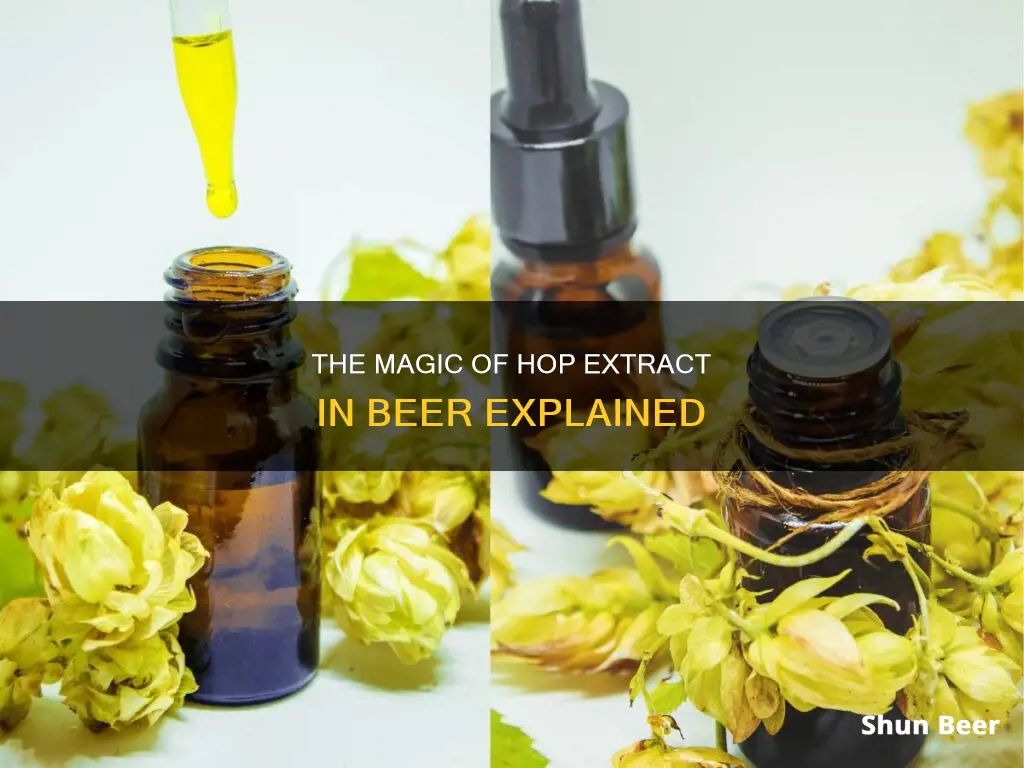
Hop extract is a product developed from the extraction of the hop components that are important to brewers. These are the alpha-acids and essential oils that contribute to beer bitterness, aroma, head retention, and stability. Hop extracts are made by taking raw fresh hops and processing them to separate the oils and aroma compounds from the leafy vegetative matter. The production of hop extract occurs at cool temperatures so that the alpha acids remain non-isomerized, allowing it to be used in a similar way to standard hops.
What You'll Learn
- Hop extracts are made by processing raw fresh hops to separate oils and aroma compounds from the leafy vegetative matter
- Hop extracts can be added directly to the wort
- Hop extracts can be used to achieve a precise IBU
- Hop extracts can be used to reduce wastage
- Hop extracts can be used to standardise flavour

Hop extracts are made by processing raw fresh hops to separate oils and aroma compounds from the leafy vegetative matter
The production of hop extract occurs at cool temperatures so that the alpha acids remain non-isomerized, allowing it to be used in a similar way to standard hops, albeit with much less material and a higher degree of precision. Hop extracts are produced using CO2 to concentrate the hop resins into a viscous liquid that can be added directly to the wort. CO2 hop resin extract, such as Hop Effect, is a product developed from the extraction of the hop components that are important to brewers. These are the alpha-acids and essential oils that contribute to beer bitterness, aroma, head retention, and stability. This is different from using pellets or whole leaf hops, as hop resin extract eliminates a great deal of the inert materials that come with pellets and leaf hops, which means less trub in the bottom of the brew kettle.
Hop extracts are designed to be used during the boil. Because the alpha acid extraction is the same for hop resin extract as it is for whole hops and pellets, the hop additions can still be staggered throughout the boiling process. Hop extracts can be used for flavour and aroma, but may not be as intense as pellets or cryo hops. They will have reduced IBU utilisation with reduced boiling time, much like hop pellets. Hop resin has a higher utilisation efficiency than leaf/pellets, roughly 5% more.
Exploring the Hops in Your Beer: Gallon Edition
You may want to see also

Hop extracts can be added directly to the wort
Hop extracts are produced by extracting the alpha-acids and essential oils from raw, fresh hops, which contribute to beer bitterness, aroma, head retention, and stability. This process eliminates much of the inert material found in pellets or whole leaf hops, resulting in less waste and a more efficient brewing process. The extraction can be done using CO2 or distillation methods, creating a highly concentrated product that is easy to store and provides consistent results.
The use of hop extracts offers several benefits to brewers. Firstly, they provide a cleaner type of bitterness compared to flowers or pellets, allowing for better flavour control. Secondly, hop extracts reduce waste by fully dissolving into the beer, which is advantageous for both commercial and home brewers. Additionally, the standardised nature of hop extracts ensures consistent and predictable results, as the variations in oil content between different hop harvests and plants are eliminated.
When using hop extracts, it is important to consider the type of extract and the desired outcome. CO2 extracts, for example, are not isomerized and therefore need to be boiled to achieve bitterness. On the other hand, isomerized extracts have already undergone isomerization and can be added at any stage of the brewing process to adjust bitterness. Brewers can also use hop oil extracts to enhance specific aromas or flavours, but these must be used carefully to avoid overpowering the beer.
Processing Hops for Beer: A Step-by-Step Guide
You may want to see also

Hop extracts can be used to achieve a precise IBU
Hop extracts are concentrated forms of these alpha acids and hop oils, which contribute to the bitterness, flavour and aroma of beer. By using hop extracts, brewers can more precisely control the bitterness level of their beer, as the concentration of alpha acids in the extract is known. This allows for a more consistent product and can also save time and money.
There are several types of hop extracts available, including CO2 extract, isomerized extract and hop oil extract. CO2 extract is created using a CO2 process to extract the soft resins and essential oils from hops. This type of extract is typically used during the boil, and behaves similarly to traditional hops, but with a higher concentration of alpha acids.
Isomerized extract contains alpha acids that have already undergone isomerization, the process that occurs when hops are boiled. This type of extract can be added at any stage of the brewing process, including after fermentation, to adjust the bitterness of the beer.
Hop oil extracts are distilled and concentrated to preserve the delicate hop oils associated with whirlpool or dry hopping. These extracts are used to enhance specific aromas or flavours, such as citrus or piney notes.
When using hop extracts to achieve a desired IBU level, brewers need to consider the concentration of alpha acids in the extract, as well as the volume of beer being brewed. The formula for calculating IBUs is:
> IBU = (extract_vol_ml * alpha_content_pct * 1000) / (volume_beer_liters)
For example, to achieve 30 IBUs in a 20-litre batch of beer, one could use 1ml of a 60% iso-alpha extract.
Hops in Beer: Necessary or Overrated?
You may want to see also

Hop extracts can be used to reduce wastage
Hop extracts are products developed from the extraction of the hop components that are important to brewers. These include alpha-acids and essential oils that contribute to beer bitterness, aroma, head retention, and stability. Hop extracts can be used to reduce wastage in several ways.
Firstly, hop extracts dissolve fully into the beer, reducing wastage. This is a significant advantage for professional breweries, where every pint counts, but it is also beneficial for homebrewers who want to minimise waste. Hops are highly absorbent and can soak up several times their weight in beer, resulting in lost beer. By using hop extracts instead of whole hops, brewers can reduce the amount of beer absorbed by the hops and increase their yield.
Secondly, hop extracts can help reduce waste by providing a more consistent product. The amount of oils in hops can vary from harvest to harvest and even from plant to plant. Hop extracts, on the other hand, can be standardised for consistent, predictable results, evening out seasonal and regional variations. This means that brewers can achieve the desired level of bitterness or aroma more accurately, reducing the risk of wasting beer due to incorrect measurements.
Additionally, hop extracts can help reduce waste by providing a cleaner and brighter beer. The use of hop extracts can diminish the vegetal aroma that sometimes gets in the way of the hop expression, resulting in a more distinct and brighter beer. This was the experience of some well-respected craft brewers, who found that using hop extracts allowed them to produce cleaner, brighter beer while maintaining hop varietal impact.
Finally, hop extracts can help reduce waste by providing a more efficient brewing process. The leaf-like parts of hops can suck up wort, lowering efficiency, clogging valves, and causing issues for harvesting yeast. Hop extracts, on the other hand, are easier to work with and can be added at different stages of the brewing process, depending on the type of extract. This flexibility can lead to a more efficient brewing process and reduce waste.
In conclusion, hop extracts can be used to reduce wastage in several ways, including improving yield, providing a more consistent product, producing cleaner and brighter beer, and facilitating a more efficient brewing process. These benefits make hop extracts a valuable tool for both professional and home brewers looking to minimise waste and improve the quality of their beer.
Hops: Brewing Demand and Future Growth
You may want to see also

Hop extracts can be used to standardise flavour
Hop extracts are a product of the extraction of hop components that are important to brewers, such as alpha-acids and essential oils. These components contribute to the beer's bitterness, aroma, head retention, and stability. Hop extracts are different from using pellets or whole leaf hops as they eliminate a lot of the inert materials that come with them, which means less trub in the bottom of the brew kettle. Hop extracts can be used during the boil, and the hop additions can be staggered throughout the boiling process.
Hop extracts are available in different types, such as CO2 extract, isomerized extract, and hop oil extract, which can be used at different stages of the brewing process. CO2 extracts are the most widely available for home brewers and are often packaged in syringes with dosages measured in milliliters. Isomerized extracts do not require boiling and can be added at any stage of the brewing process to adjust the bitterness. Hop oil extracts, on the other hand, are distilled and concentrated to preserve the delicate hop oils associated with whirlpool or dry hopping.
Hemp and Hops: Exploring the Botanical Cousins
You may want to see also
Frequently asked questions
Hop extract is a product developed from the extraction of the hop components that are important to brewers. These are the alpha-acids and essential oils that contribute to beer bitterness, aroma, head retention, and stability.
Hop extracts are made by taking raw fresh hops and processing them to separate the oils and aroma compounds from the leafy vegetative matter. The oils can be split up to separate just the alpha acids that give beer its bitterness, or to pull out just the bright flavour compounds.
Hop extract improves the utilisation of the alpha acids and can affect the final aroma of the beer. Hop extracts also dissolve fully into the beer, reducing wastage. They can also be used to hit a precise IBU.
There are three basic types of hop extracts: CO2 extract, isomerised extract (or ISO-extract), and hop oil extract.
There are a couple of ways to add hop resin extract to your wort. One way is to mix the extract with hot water/wort in a cup and pour this mixture into the boiling wort at the desired time.







